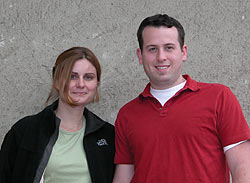Berkeleyan
Four-legged law comes to Berkeley
Boalt joins the pack of top-dog schools offering animal-law courses
![]()
| 16 February 2005
Drop the phrase "animal law" in casual conversation and you're apt to prompt a variation on Rush Limbaugh's line about the liberal Ninth Circuit Court of Appeals, which, according to the prince of right-wing radio, is "considering giving whales the right to sue."
Bruce Wagman has heard the jokes. As one of the country's foremost courtroom advocates for the furry and feathered, however, the verbal volleys lobbed his way pale beside the outright cruelty routinely heaped upon animals.
 Bruce Wagman, an "ethical opportunist" who looks for ways to protect animals using laws now on the books. (Barry Bergman photos) |
Wagman is an attorney in the case, which is now being heard in North Carolina, the only state in the nation where civil actions, and not just criminal indictments, can be brought in response to suspected animal abuse and neglect of somebody else's animals. More than 80 dogs have been removed from the house, he tells the class, where conditions were so squalid they made investigators physically ill. Convictions in such cases are rare, he adds, because the alleged hoarder, an elderly woman, is "not someone who's beating these animals with a bat. It's someone who has a disease."
But Wagman, a pony-tailed, Brooklyn-born former nurse, is far more interested in the animals' fate than their owners'. And ownership, from that standpoint, is the crux of the problem. For the most part, U.S. law treats animals not as sentient beings but as property, and gauges their worth in the same way - that is, based on their market value - as it would a piece of furniture. A central question for the class, Wagman tells them, is "whether being property is an insurmountable obstacle for animals."
That question is also a focus of heated debate within the animal-rights movement, many of whose partisans insist on revolutionary changes in the status of what they like to call "nonhuman animals."
"I would love to see the property status of animals eliminated," Wagman agrees. But the demise of "the property paradigm," he believes, is so far off as to constitute a diversion: "My main goal is to increase protections for animals as quickly as possible, and I think a quicker way is to work within the system, regardless of their status."
Although much of his courtroom work has an educational component - he was co-counsel, for example, in a high-profile suit accusing the California Milk Advisory Board of misleading the public with its "happy cows" ad campaign - Wagman is spending more and more time in the classroom. In addition to Boalt, where the course is now being offered for the second time, he also teaches animal law at the University of San Francisco and at UC's Hastings College of the Law, from which he graduated magna cum laude in 1991. Stanford is interested as well.
 A new breed of lawyer Founded in 2002, the Boalt Animal Law Society pushed to bring Bruce Wagman's animal-law course to Berkeley. Ironically, both of the student group's co-presidents, Jon Neumann (above, right) and Larissa Burford (above, left), will graduate without ever having taken the class. For students like them who are not just taking required classes but serving as graduate-student instructors in others, fitting a once-a-week elective into their schedules has proved a losing battle. The soon-to-be tax attorneys, now in their third and final year at Boalt, had only two chances to take the course, which wasn't available when they arrived. Part of the organization's mission, they say, is ensuring that the class is offered every year. The pair also want to see it upgraded from an elective to part of the core curriculum - a hope buoyed by the fact that Dean Christopher Edley is a product of Harvard, "one of the first schools to offer animal law," Neumann points out. Berkeley, however, is not the bastion of animal rights that some might expect. "You'd think at Berkeley, because it's so hard-core social justice, that folks wouldn't be too cynical about it - as opposed to some law school where everybody's being farmed out to corporate America," says Neumann. "But sometimes you get a sentiment that people's efforts toward any sort of justice is a zero-sum game, and that there are hierarchies of what's important and what to put your time into. There's a very humanistic strain here, where animal law is seen as frivolous." Burford, however, notes that animal abuse has been linked to domestic violence, and adds, "We're all part of an interconnected movement." Among other outreach efforts, the club sponsors an annual "Animal Awareness Week," which this year will take place at Boalt Feb. 28 through March 2. The three-day event features a bake sale with vegan and non-vegan items, along with educational materials on wildlife, factory farms, and companion and research animals. While neither plans to become a full-time animal lawyer - "It's kind of hard to land a sweet animal-law job coming out of law school," laughs Neumann - both expect to do pro bono work on behalf of animals. "My mom says I was born caring about animals, and I guess I just never lost it," Burford says. "I'll probably continue my whole life to do stuff for animals." Neumann, a native of western Pennsylvania's deer country and the son of a minister, jokes that his "mixed background" makes for "kind of a schizophrenic Thanksgiving." His father, he says, taught him the value of "standing up for folks who don't have a voice, regardless of whether they walk on two legs or not. That's kind of what the organization's about - caring for the innocent who can't defend themselves against those who would like to exploit them for their own benefit." |
Dershowitz, Kunstler . . . and Slick?
For still further evidence of the field's growing acceptance, Wagman points to Yale Law School, which hosted a November conference on "The Future of Animal Law," sponsored by the Petaluma-based Animal Legal Defense Fund. Wagman, ALDF's part-time litigation director - he's also a partner with Morgenstein & Jubelirer in San Francisco, focusing on employment and product-liability law - was among the speakers, along with Harold Koh, now the school's dean. An earlier conference at Harvard Law School, "The Evolving Legal Status of Chimpanzees," featured an appearance by constitutional expert Alan Dershowitz.
Shortly before his death in 1995, another marquee name, William Kunstler - the famed human-rights lawyer whose clients included Lenny Bruce, Martin Luther King, Jr., and the Chicago 7 - also took up the cause of animal advocacy, a conversion that helped lead Wagman to animal law. It was in 1992 that Wagman, then clerking for a federal judge, popped in to a breakout session at the annual meeting of the American Bar Association in San Francisco. He found Kunstler taking part in a panel discussion with, among others, Joyce Tischler, a co-founder of the nonprofit ALDF, and Jefferson Airplane alum Grace Slick.
"I knew nothing, absolutely nothing about [animal rights]," Wagman recalls. "Up to that day I was a meat-eater - made the best ribs around - but I walked out of that conference a vegetarian, and six months later I was a vegan. And I'm not somebody who has these kinds of epiphanies."
The revelation, he says, was the unspeakable cruelty of factory farming. Wagman, who until then was focused on human, not animal, rights, was then on the verge of sending his résumé to Indian reservations. "That changed it all, right then and there. I said if I do anything for good, it's going to be for animals."
Unlike dogs and cats, he explains, farm animals are not protected by anti-cruelty statutes. And the rise of industrial farming has vastly increased the suffering of cattle, pigs, chickens, and other animals raised for food.
"The farmer who went out and chopped his chicken's head off went out and got the chicken from a yard where the chicken ran around all day. The chicken had a life before his head got chopped off," he says. "These animals are tortured from the day they're born. The ones who die quicker, I will unequivocally state, are in much better shape, and are saved from much greater torture."
That's why, when the California Milk Advisory Board launched its popular "happy cows" ad campaign, Wagman was happy to join People for the Ethical Treatment of Animals (PETA) in its efforts to stop the ads. The TV spots, he says, "make it look like cows in California have a good life," an important selling point for the state's consumers. "The fact is," he continues, "that California cows are probably the worst-treated in the country - or at least are not treated anywhere near the way it looks in those ads." The lawsuit was dismissed on technical grounds, though PETA could still appeal the ruling.
In contrast to what he terms "the absolutist approach," Wagman characterizes himself and his colleagues as "ethical opportunists," seeking to employ existing law wherever possible to boost protections for animals. One promising avenue is to seek damages for "pain and suffering" in cases involving the death or injury of household pets, an indirect way of establishing, in court, that "companion animals" are inherently different from cars or backpacks - not people, that is, but not things, either.
"It's based on a moral imperative," declares Wagman, who lives with his wife, three dogs, and four cats. "That's why I do what I do. I can't fathom not doing what I do - I feel like there's no higher calling than to try to save or reduce the suffering of all these innocent beings our society has decided are disposable."
"Nobody who wants animal rights," he tells his class, "thinks animals should have driver's licenses and be allowed to vote.. The real issue is that a dog was hurt, and for somebody to recognize that."

